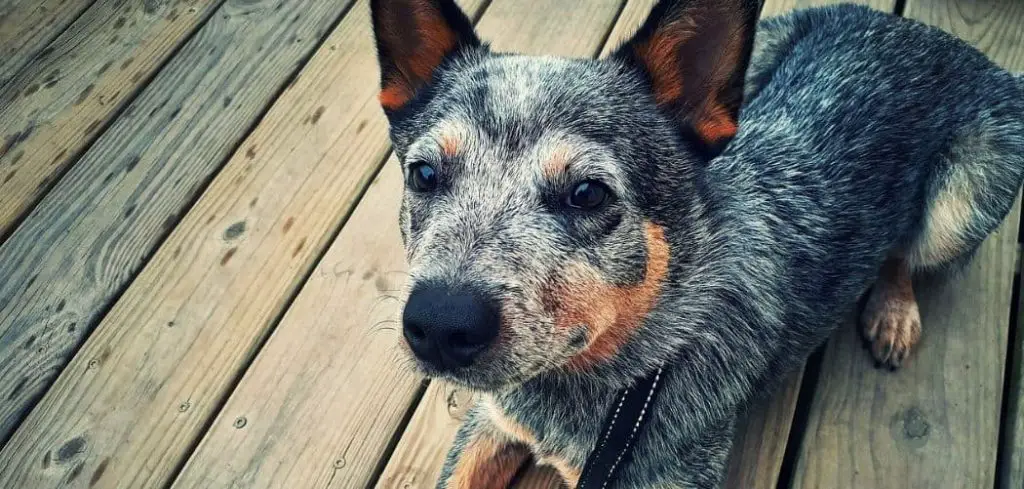When a dog is panting and rubbing its face, it often signals that something is bothering or irritating them physically or emotionally.
While panting can be a normal response to heat or exertion, when it’s paired with repeated face rubbing, it can suggest that your dog is feeling uncomfortable or trying to relieve an itch or irritation.
We outline the common reasons why a dog may pant and rub their face, what you can do at home, and when to seek veterinary help.
Dog Panting and Rubbing Face — Why It Happens
Dog panting and rubbing the face often indicate irritation, discomfort, or an allergic reaction. The panting may stem from stress, pain, or overheating, while the face rubbing suggests itchiness or irritation from causes such as allergies, insect bites, ear infections, dental pain, or contact with irritants like grass or cleaning products.
Some dogs also rub their faces when anxious or to relieve sinus pressure.
Observing when and how often this behavior occurs can provide important clues about what’s going on.

Dog Panting and Rubbing Face: Common Causes
Allergies
Allergies are a frequent cause of panting and face rubbing in dogs. Environmental allergens like pollen, dust, or mold, as well as food ingredients, can irritate the skin and eyes, leading to pawing, face rubbing, and panting due to discomfort or mild stress.
Other signs include watery eyes, sneezing, itchy ears, and inflamed skin. Identifying and avoiding triggers, along with veterinary-prescribed antihistamines or medicated shampoos, can reduce symptoms and improve comfort.
Read more: Dog Panting and Itching a Lot (Learn when to worry)
Eye Irritation or Infection
Eye irritation or infections often result in dogs rubbing their face and panting. Conditions such as conjunctivitis, corneal scratches, or foreign objects in the eye can cause redness, discomfort, and pawing or rubbing behaviors. Panting may occur as a stress response to the pain.
Look for redness, discharge, squinting, swelling, or sensitivity to light. Prompt veterinary evaluation ensures proper treatment, preventing worsening of the infection or potential vision damage.
Dental or Oral Problems
Dental issues like gum disease, tooth infections, or oral injuries can lead to face rubbing and panting. Pain in the mouth may cause your dog to paw at their face, rub against furniture, or drool excessively. Panting can be a response to the discomfort and stress.
Other signs include bad breath, reluctance to eat, drooling, and visible swelling in the gums or jaw. Regular dental check-ups and early intervention are key to preventing serious oral health complications.
Ear Infections
Ear infections can make dogs rub their face and pant due to discomfort and pain. Bacterial or yeast infections in the ear canal can cause itching, redness, and inflammation, often prompting pawing or rubbing against objects. Panting occurs as a reaction to pain or stress.
Other symptoms include foul odor, head shaking, discharge, and sensitivity around the ears. Veterinary treatment typically involves ear cleaning, medication, and sometimes long-term management for chronic cases.
Skin Irritations or Dermatitis
Dermatitis and other skin irritations can lead to face rubbing and panting in dogs. Contact with irritants, flea bites, or allergic reactions can cause redness, itching, and discomfort. Panting may result from mild stress or agitation.
Watch for redness, hair loss, scabs, or excessive scratching in affected areas. Proper diagnosis and treatment, including medicated ointments or allergy management, can relieve discomfort and prevent secondary infections.
Foreign Objects or Trauma
Foreign objects, such as grass seeds, thorns, or small debris, can lodge in the face or eyes, causing dogs to rub their face and pant. Trauma or scratches may also contribute to similar behaviors. Panting reflects stress or pain.
Signs include sudden pawing at the face, swelling, redness, or visible debris. Immediate veterinary examination is essential to safely remove foreign material and prevent infection or tissue damage.
Stress or Anxiety
Stress and anxiety can cause dogs to rub their face and pant. Behavioral triggers, such as loud noises, changes in routine, or new environments, may lead to compulsive face rubbing and panting.
Other indicators include trembling, pacing, whining, or clinginess. While short-term stress responses are normal, persistent behaviors may require behavioral training or veterinary guidance.
What to Do If Your Dog Is Panting and Rubbing Their Face
Create a calm and safe environment for your dog to reduce stress and prevent further irritation.
Monitor for visible signs of injury, redness, discharge, or swelling, and note any changes in behavior or appetite.
Avoid rubbing or touching the affected areas, which may worsen irritation or cause pain.
Offer water to help with comfort and hydration, especially if panting is pronounced.
Schedule a veterinary visit to determine the underlying cause and start appropriate treatment, particularly if symptoms are persistent, sudden, or severe.
When to Call or Visit Your Vet
Seek veterinary attention if your dog shows:
Persistent or worsening face rubbing with panting
Signs of pain, swelling, or bleeding around the eyes, ears, or mouth
Discharge, odor, or redness
Lethargy, appetite changes, or unusual behavior
Difficulty breathing or excessive panting
Early evaluation ensures accurate diagnosis and prevents complications like infections, dental disease, or vision loss.
Read more: Dog Panting and Itching At Night (Here’s why)
Key Takeaway
Panting and rubbing the face in dogs can stem from allergies, eye or ear infections, dental issues, skin irritations, trauma, or stress.
Careful observation, minimizing stress, and seeking timely veterinary care are critical to relieving discomfort and protecting your dog’s health.
Early intervention ensures your dog remains happy, comfortable, and pain-free.
